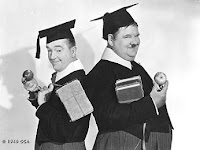In rehearsal, performance or in an acting class, actors need to
feel free so they can
be free to explore all aspects of the emotional life of a character and scene. Actors need to be uninhibited and emotionally vulnerable. They can’t be restricted by self-censorship or fear of failure. Actors need to feel safe enough to drop the defenses they’ve developed for life in the real world and remove their carefully crafted social masks so they can be as playful, as open and as un-self-conscious as a child.
A good director or acting teacher will create a working environment where actors feel secure and emotionally protected so they can quickly develop enough trust to be vulnerable and uninhibited. This can’t be treated casually. The importance of a safe, nurturing working environment for actors cannot be overstated. An actor’s creativity flows freely when they are unimpeded by judgment, analysis and censorship. Collaboration works best in an environment of openness and trust.
In my acting classes, I use many games and exercises to develop an environment of trust. One series of exercises involves actors passing balls around in a circle. These exercises have many steps and variations, and I won’t go into detail here, but there is an important point of discussion that arises when I first introduce these exercises to a group of acting students.
I use air-filled toy balls about the size of a volleyball. They’re very light and bounce easily. When the first ball is introduced into the circle, the actors are simply instructed to call out someone’s name and pass that person the ball. I usually let this first game go on for several minutes without further instruction and, almost always, the speed of the game soon increases and one or two actors start throwing the ball in ways that make it difficult to catch. Others quickly pick up on this trend and start tricking each other into missing a catch. Within minutes, the ball gets out of control and bounces out of the circle.

This trend used to frustrate me until I realized it’s an excellent illustration that helps actors recognize the behaviour and attitudes they’ve learned on the playground and the sports field. The ball bouncing out of the circle is an eloquent demonstration of how competitive, selfish behaviour is counterproductive to collaboration and teamwork.
Teamwork is as fundamental to actors as it is to athletes. But, there’s a significant difference in how we view success in the performing arts versus the way we measure success in competitive sports. It’s an important difference that actors must understand.
Simply put, success in sports is called winning, which implies there must be a loser. In other words, success is measured against the failure of others. The implication – right or wrong - is that for one to succeed, others must fail. To be the best is ideal – so we must strive to be better than everyone else and work to make others fail. This attitude may be a key to success in sports, but it’s the key to failure for an actor. That’s the attitude that caused the ball to bounce out of the circle.
Just like in sports, an actor is part of a team. They must work with the other actors, the director and the crew to do the best work possible to succeed as a team. However, the success of an actor and the production are dependent on the success of everyone and enhanced by the failure of no one. An actor doesn’t succeed by winning because there is no one to defeat.
When the young actors in my class are encouraged to throw the ball with the intention of ensuring a successful catch, their focus shifts from the throw to the catch. They make eye contact with other actors in the circle, communicate readiness and carefully throw the ball in a manner that ensures it will be caught. With this small shift of attitude and intention the ball tossing exercise can quickly and easily be developed into a complex series of exchanges with several balls moving rapidly around the circle in complicated patterns with very few missed catches. Now, the ball rarely bounces out of the circle.
Throwing a ball around in a circle seems quite simple but the actions of throwing and catching are not the point of these exercises. When both actors commit completely to the successful completion of the ball transfer, they start to trust and rely on each other and they almost always succeed even as the task becomes more challenging and complex. The important discovery for the actor is the powerful connection that is formed between people who are focused on the successful completion of a shared task with openness and trust.
The beauty and magic of acting are manifested in the unspoken connection between actors who are fully committed and openly engaged in the action of the moment and the almost divine exchange of energy that occurs through that connection.
Friendships, marriages, families, communities and even nations are created and succeed not just through action, but also through the personal, emotional and spiritual connections that are created, revealed and renewed, by those actions. Electing an exciting new leader, playing a game, making love, singing in a choir, watching a play and acting are all actions. But it’s the powerful personal connection that occurs between the people who are openly and willingly sharing those actions that is valuable, joyous and wonderful.
When actors in a company or a class can feel free to work with openness and trust in a secure, supportive environment where everyone’s success is equally important, collaboration and creativity will flourish. When everyone’s success is valued, everyone’s success is assured.
Good advice for actors. Good advice for all of us.



